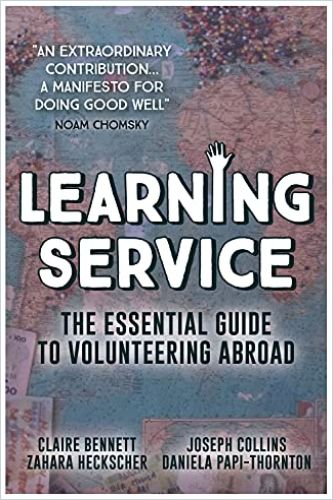“Voluntourism” – going abroad to perform volunteeer work – has emerged as a top trend in travel, but it often does more harm than good. Four experts in educational tourism, social justice and development policy offer a guide to leaving a positive impact – and making the most of the experience yourself.

Doing Voluntourism Right
Every year, some 10 million people travel abroad to do volunteer work – a practice known as impact tourism or “voluntourism.” Travelers undertake work such as nature conservation, wildlife monitoring, construction, teaching, caregiving or ímproving human rights, while exploring a foreign place and culture. At best, these experiences provide concrete benefits to communities while fostering cross-cultural understanding. Volunteers often benefit, too, by enhancing their careers or pursuing self-improvement or self-actualization.
But voluntourism – a $2 billion industry – has come under fire for sometimes causing more harm than good. Good intentions go awry when volunteers swoop in to “help” without understanding what communities really need, when volunteers take jobs that otherwise would go to locals, or when people volunteer in order to feel good about themselves rather than to serve the communities they visit.
Volunteers do not always do good. Positive intentions do not always result in beneficial outcomes.Joseph Collins et al.
Voluntourism experts Joseph Collins, Zahara Heckscher, Claire Bennett and Daniela Papi-Thornton have compiled a useful guide to help potential and current voluntourists ensure their efforts will truly benefit the people they aim to help, and to make the most of the experience themselves.
The authors bring deep expertise of their subject, as well as firsthand experience as volunteers themselves. Bennett manages operations for the educational tourism company PEPY Tours, and Collins co-founded the Institute for Food and Development Policy. Heckscher, a social justice organizer, co-wrote How to Live Your Dream of Volunteering Overseas, a classic manual for volunteers. Papi-Thornton, an expert on social entrepreneurship and systems-led leadership, created the work systems tool Impact Gaps Canvas.
Put Learning First
For a truly enriching experience, the authors stress, volunteers need to embrace a “learning service” mind-set and commit to learning from those they serve. And the learning should begin even before a person decides to volunteer overseas. As a first step, the authors say, people considering voluntourism should learn about themselves and develop self-awareness about their own motivations, attitudes and assumptions.
Self-awareness is the single most important quality someone must possess in order to successfully learn about and contribute to the world.Joseph Collins et al.
Often, unexamined attitudes and assumptions need to be unlearned so a person can truly understand and serve those they hope to help. And the first assumption to examine, the authors suggest, is whether voluntourism is really the right choice. Volunteering overseas isn’t for everyone, and those considering it should take time to explore other options that might suit them better – such as backpacking, an organized educational tour or volunteering in their home country, for example.
Find a Good Fit
Once you’ve confirmed that voluntourism is right for you, the next step is to decide exactly how you’ll pursue it. The authors highlight the need to identify volunteer opportunities that align with your goals, values and motivations – whether you want to develop new skills, gain life experience, contribute to positive global change or make an impact in some other way.
Volunteer travel…can be a powerful and authentic way to see and contribute to the world, but it’s not the only way to achieve these goals.Joseph Collins et al.
After deciding on your why and what, the authors say, you’ll need to make choices about where, when and how: a short-term versus a long-term placement, in a rural or urban setting, whether to use an agency or find an opportunity on your own, whether to travel and volunteer solo or in a group, and so forth. You’ll need to consider, for example, the respective pros and cons of volunteering for nongovernmental organizations (NGOs), governmental organizations and social enterprises.
Prepare Intelligently
Readying yourself to serve as a volunteer abroad should include additional learning as well as developing the hard and soft skills you’ll need, the authors say. They emphasize the need for all volunteers to educate themselves on the history of development in the host country, as well as the country’s colonial history and the impact of global commerce and imperialism in the region.
To develop helpful hard skills before you travel abroad, consider taking a relevant class or certification course at a community college, or studying the local language. Work to cultivate attitudes and qualities that will help you in your role – soft skills such as openness, patience, humility and empathy. The authors also cover practical concerns, such as fundraising, health care and clothing choices.
Adjust and Adapt
All four authors have extensive firsthand experience as volunteers, and this shows in their empathic advice on adjusting to cultural norms and contexts – both during and after travel. Volunteers typically go through a honeymoon phase of feeling upbeat, positive and full of energy at first. But this often gives way to a post-honeymoon low: the tiredness and frustration many people experience a few weeks or months into their trip, signaling a need to calm down and regain perspective.
Many volunteers also suffer culture shock: feelings of stress, anger, isolation, anxiety, loneliness or irritation, perhaps because they struggle to accomplish basic tasks in the new international context, feel frustrated by cultural norms with which they don’t align, or have communication difficulties. The authors recommend remaining open-minded and pursuing connections and activities that bring joy.
Don’t ask yourself what the world needs. Ask yourself what makes you come alive, and go do that, because what the world needs is people who have come alive.Writer and philosopher Howard Thurman
The book concludes by describing the impact that a volunteer travel experience can have on a person’s life, long after it ends. Some voluntourists discover a new career path or apply the learning service mind-set to other aspects of life. Some go on to engage in activism in their home country, start their own nonprofit organization or simply become more mindful about their consumer choices.
Perhaps the most positive and long-lasting impact, the authors suggest, is embracing a learning service mind-set. Those who come away from their voluntourism experience with this new perspective will likely continue to prioritize sustainable growth and long-term solutions – and that’s good for everyone.













